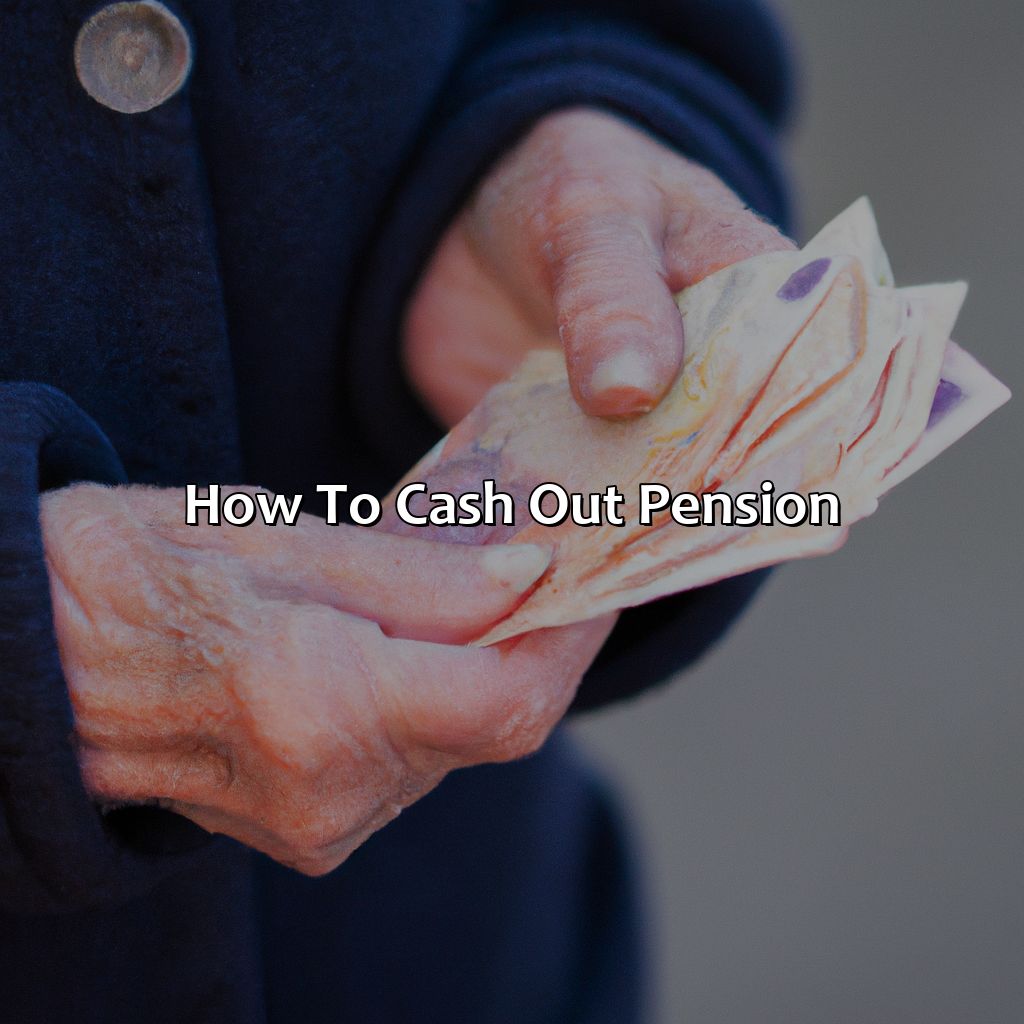How To Cash Out Pension?
Key Takeaway:
- Pension cash out involves receiving a lump sum or annuity payment from your pension plan, either because you need the money or want to transfer to another plan. It is important to understand the types of pension plans and eligibility factors before cashing out.
- Eligibility for pension cash out depends on a variety of factors such as age, length of service, and plan type. Understanding these factors and limitations is important to determine if cashing out is a viable option.
- To cash out your pension, you need to review your pension plan details, contact your provider, choose a payment option and complete the required paperwork. It is important to consider the tax implications and penalties for early withdrawal before making a decision.
Have you ever wondered how to access the money you stored in your pension pot? Wouldn’t it be nice to know the options available to you? You’re in luck! This article will explain the different ways you can cash out your pension.
Understanding Pension Cash Out
Let’s start by understanding what pension cash out is. To grasp this, it’s essential to know how to cash out your pension. Additionally, various types of pension plans are available which can answer your questions.
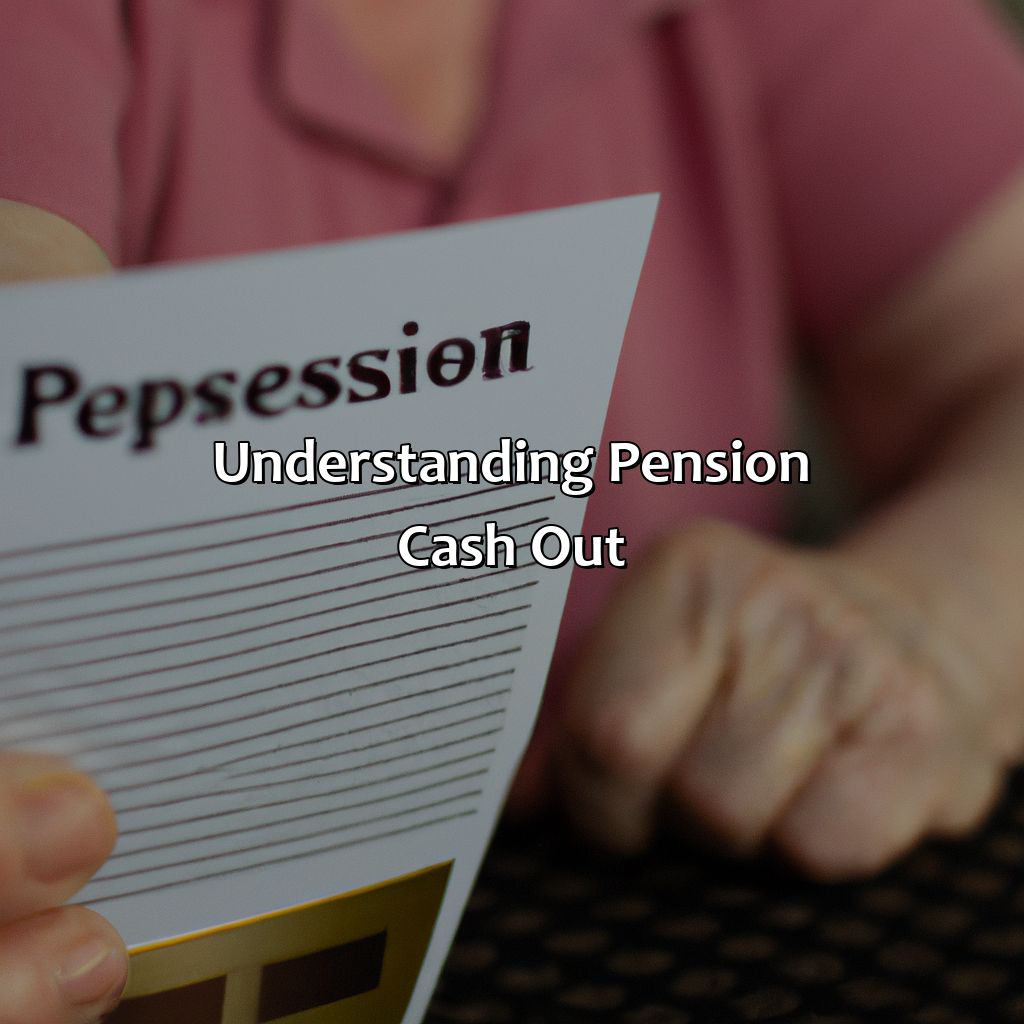
Image credits: retiregenz.com by Harry Woodhock
What is Pension Cash Out?
Are you looking to cash out your pension? Pension Cash Out refers to the process of taking a lump sum payment from your pension plan either entirely or partially. It is an alternative option for individuals who no longer wish to rely solely on their pension income during retirement.
To cash out your pension, you need to choose between two options – whether you want a full or partial cash-out. A full cash-out allows you to take all the money in your account at once, while a partial cash-out is when you withdraw some of the funds and leave the remaining balance in your account. However, it is essential to note that withdrawing money early can reduce the amount of money available to support yourself during retirement.
Opting for Pension Cash Out should be carefully considered as it may not be suitable for everyone. Individuals should look into their situation and understand their financial needs before choosing this option. Risk tolerance and financial goals such as paying off debts are some reasons one might consider this option.
Before deciding on cashing out, individuals must also consult with a financial advisor. There are also potential tax implications, where withdrawing large sums may result in having higher taxes than anticipated. Therefore consulting with an expert would help determine if this option aligns with individual retirement goals and priorities.
In summary, Pension Cash-Out opens up opportunities for those who wish to take control of their retirement finances by withdrawing some or all of their funds early on; however, opting for a full or partial cash-out requires careful consideration of individual circumstances and consultation with experts before making any final decisions.
From the traditional defined benefit plan to the modern 401(k), there’s a pension plan for every generation to complain about.
Types of Pension Plans
Common Varieties of Pension Schemes
A pension is a retirement fund set up by an employer or individual and is divided into different schemes, depending on the type of plan. There are two significant types of pension arrangements: defined benefit (DB) plans and defined contribution (DC) plans.
Important Types of Pension Plans
Below is a table showing the most important types of pension plans:
| Type | Explanation |
|---|---|
| DB | The employer provides a set monthly amount upon their retirement based on their salary |
| DC | Occasionally referred to as 401(k), this strategy requires employees to donate a portion of their income towards their retirement. |
| Cash Balance | Employers promise to credit contributions each year for its staff. |
It is crucial to note that the three types of pensions mentioned above are not the only ones obtainable from employers.
Fascinating Pension Facts
The term “pension” traces its origins back to Roman times when soldiers were given land or money when they retired from service after 20 years. This idea expanded in Europe during the 1800s, when seniors were provided with an in-kind pension system to classic welfare states today.
Getting older has its advantages – like being eligible for pension cash out, assuming you haven’t blown all your retirement savings on avocado toast and online shopping.
Eligibility for Pension Cash Out
Are you eligible for pension cash out? To find out, learn the factors! In this section, let’s explore what affects your eligibility. We’ll look at the factors and age restrictions to consider before deciding to cash out your pension.
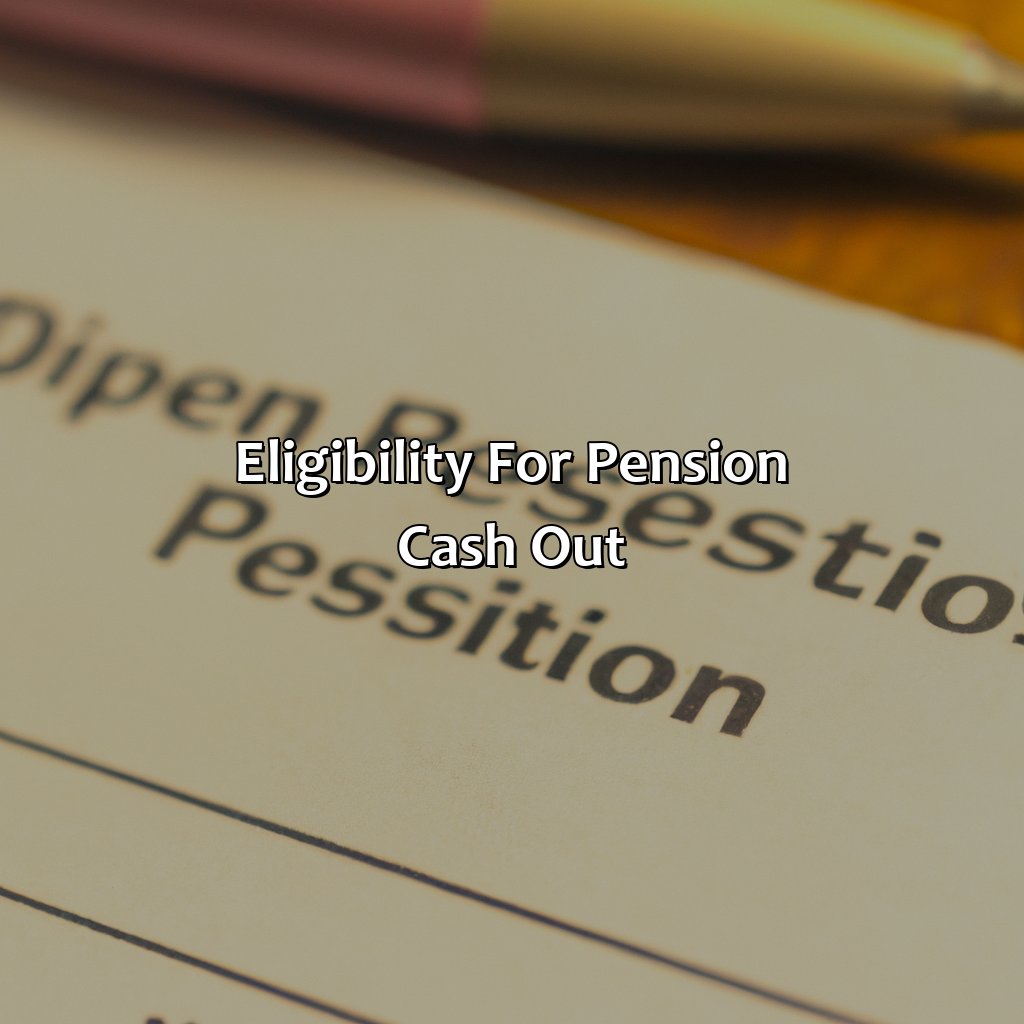
Image credits: retiregenz.com by David Woodhock
Factors Affecting Eligibility
To be eligible for pension cash-out, various factors need to be considered such as length of service, age, and the type of plan. The individual must also not be receiving regular payments from their pension plan. Additionally, factors such as the current economic environment and personal financial needs should also be taken into account.
It is essential to note that specific eligibility requirements vary based on the type of pension plan and the country’s regulations. Therefore, it is crucial to consult with a financial advisor or pension specialist to determine one’s eligibility accurately.
While certain documentation may be required during the cash-out process, the benefits of taking out a lump sum payment include greater flexibility in managing one’s finances. The availability of funds can provide peace of mind and allow individuals greater control over their retirement planning.
Ultimately, failing to consider cashing out a pension could result in missed opportunities to enjoy life post-retirement fully. It is recommended that those considering retiring without a pension do so with careful consideration under expert guidance.
Looks like retirement just got even more elusive – turns out there’s an age limit for cashing out your pension.
Age Limitations for Pension Cash Out
“Once eligible, how to obtain pension cash out is a common query among retirees. The guidelines may vary depending on the retirement plan and rules governing it. However, there are age limitations for pension cash out that one should consider.”
In most plans, individuals can cash out their pension once they reach the age of 55 or have retired, whichever comes first. However, some schemes require you to wait until you attain the minimum age of 60 years before accessing your pension funds.
It is essential to note that some policies allow partial withdrawals while others mandate full repayment of the amount received from a lump sum payment. Hence individuals must carefully read the provisions and terms of their retirement cover.
Sometimes, changing life circumstances warrant early withdrawal of one’s pension such as financial emergencies or career shifts. Nevertheless, one has to pay significant charges and taxes when breaking into savings prematurely. If you’re wondering how to withdraw from pension, it is recommended to seek professional advice to avoid incurring unnecessary costs.
Anecdotal evidence states an instance where a senior citizen required urgent medical attention but could not access his pension due to being younger than the required retirement age capped under his plan. Are you also wondering how to collect pension early? There are options available, but it is important to understand the potential consequences and seek professional advice before making any decisions.
Finally, a retirement plan that involves more than just cat food and bingo nights.
Steps to Cash Out Pension
- Review your pension plan.
- Contact your pension provider.
- Talk about your options.
- Pick your payment method.
- Fill out the forms.
- You’re then on track to get your money!
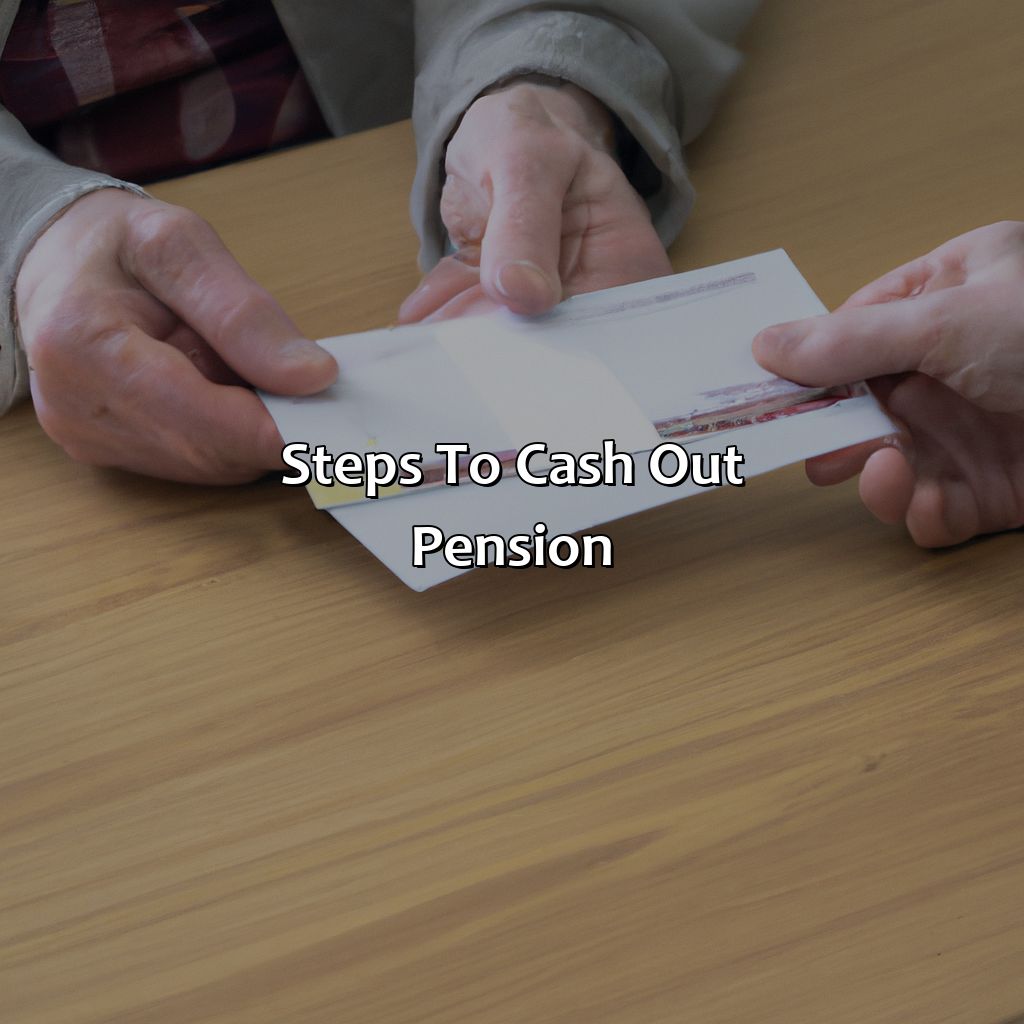
Image credits: retiregenz.com by James Duncun
Review Pension Plan
Assessing Your Pension Plan for Optimal Cash Return
Evaluating your pension plan is crucial before considering cashing out. Familiarize yourself with the options to maximize returns and avoid costly mistakes. Start by assessing the plan’s:
- vesting schedule
- contribution rate
- investment portfolio
Determine if your pension has a fixed or variable payout for retirement. A fixed plan offers certainty in payout amount, while a variable plan fluctuates based on market performance. Assess how long you need to hold the plan before qualifying for penalty-free withdrawals.
Understand the tax implications of early withdrawal or opting for a lump-sum payment instead of periodic payments. Consult a certified financial planner who can provide informed guidance and weigh the pros and cons of each option. For those wondering about widows pension, it is important to know how to apply for it.
To optimize your pension’s cash value, consider working with an investment advisor that can help restructure your retirement funds to align with future plans and goals. Contributing consistently throughout employment years can afford extra padding in retirement, make sure you check your pension and exhaust all possibilities before cashing out on your hard-earned benefits.
Get ready for the ultimate game of phone tag as you try to contact your pension provider- it’s like playing hide-and-seek with your retirement savings.
Contact Pension Provider
When considering cashing out pension, it is vital to reach out to your retirement fund provider. They will provide proper guidance on the procedure required and the necessary documentation. This step must be completed first to avoid encountering challenges in accessing your pension funds.
Additionally, when contacting your pension provider, it is crucial to provide accurate personal details to enable a smooth process. Your full name, identification number, and date of birth are some of the data you may need to submit. Wondering how to claim your civil service pension? Read our guide for more information.
A critical aspect that you may inquire about when contacting the pension provider is tax implications and deductions from your retirement benefits. This knowledge will enable you to prepare adequately for any taxes or fees that may arise.
Pro Tip: Contacting your pension provider as early as possible will give ample time for paperwork processing and ensure timely disbursement of funds. If you’re wondering when can I get my state pension, it’s important to plan ahead and contact your provider early.
Deciding how to get paid your pension is like choosing between getting a root canal or sitting through a marathon of a terrible sitcom.
Choose Payment Option
When planning to cash out your pension, picking the right payment option is crucial. Here are some options to consider:
- Lump Sum Payment – Receive your pension in one large payment.
- Annuity – Get a stream of payments either for life or a set number of years.
- Combination Plan – Combine both lump-sum and annuity plans.
By choosing the correct payment option, you can tailor your retirement income goals according to your wishes and desires.
Remember that choosing a payment plan depends on many factors such as age, family status, savings goals and other financial situations that may apply to you. Conduct proper research, weigh up potential offers before making any final decisions.
One suggestion might be to use an online calculator which can help determine different payment schemes relative to how much has been contributed to the plan over time. Another suggestion could be to contact an accredited independent financial advisor who provides pension advice services in guiding you through such complex decision-making processes while keeping your unique needs at heart.
Get ready to fill out more paperwork than you did when you first got hired – filling out forms is the new retirement hobby.
Complete Required Forms
When it comes to cashing out your pension, completing the necessary forms is a crucial step. This ensures that all required information is provided and no delays or issues arise later on.
To complete the requirements, follow these six steps:
- Obtain the necessary forms from your pension provider.
- Fill in all of the required information on each form accurately.
- Attach any supplemental documents as needed (such as identification or proof of retirement).
- Check for any additional forms or signatures that may be required.
- Submit all completed forms and supplemental documents to your pension provider according to their instructions.
- Keep a copy of all documents for your records.
It’s important to note that different providers may have slightly different processes or requirements when it comes to completing the necessary forms. Make sure to thoroughly read and follow their specific instructions to avoid any delays or issues.
One thing to keep in mind is that completing the forms correctly and completely can help speed up the process and ensure that everything goes smoothly. It can be helpful to double-check all information and make sure that nothing is missing before submitting the paperwork.
Pro Tip: If you’re unsure about anything when filling out your pension forms, don’t hesitate to reach out to your provider for assistance. They’re there to help you through this process, and can provide valuable guidance if you have questions or concerns.
Time to start planning that retirement party, because soon enough those pension funds will be rolling in like a rockstar’s royalties.
Receive Funds
When looking to cash out your pension, receiving funds will be a crucial step in the process. This involves transferring the available balance from your pension plan into your designated account. You can expect to receive a lump sum or regular payments, depending on the option you choose.
To cash out your pension, you need to know where to find your pension information. How do I find my pension information? Once you have your information, you must meet certain eligibility requirements and fill out the necessary paperwork. This paperwork typically includes forms that verify your identity and provide information about your chosen payment option. After submitting the required documents, the pension provider will transfer the funds to your designated account.
It’s essential to consider tax implications when choosing a payment option. For example, taking a lump sum payment may result in higher taxes than receiving regular payments over time. Additionally, it’s crucial to understand how receiving funds may impact any other government benefits you may be receiving.
One person who recently went through this process discovered that their decision to take a lump sum payment rather than regular payments had unexpected tax consequences. They advise others to carefully weigh their options and seek professional advice before making such an important financial decision.
Before cashing out your pension, remember that Uncle Sam always wants a cut – prepare for the tax implications of your financial liberation.
Tax Implications of Pension Cash Out
Tax implications when cashing out your pension? Read on! Uncover expenses and fines you could face. Dive deeper to learn more. Get insight into the taxable amount and penalties for early withdrawal. Learn all you need to know about cashing out your pension.
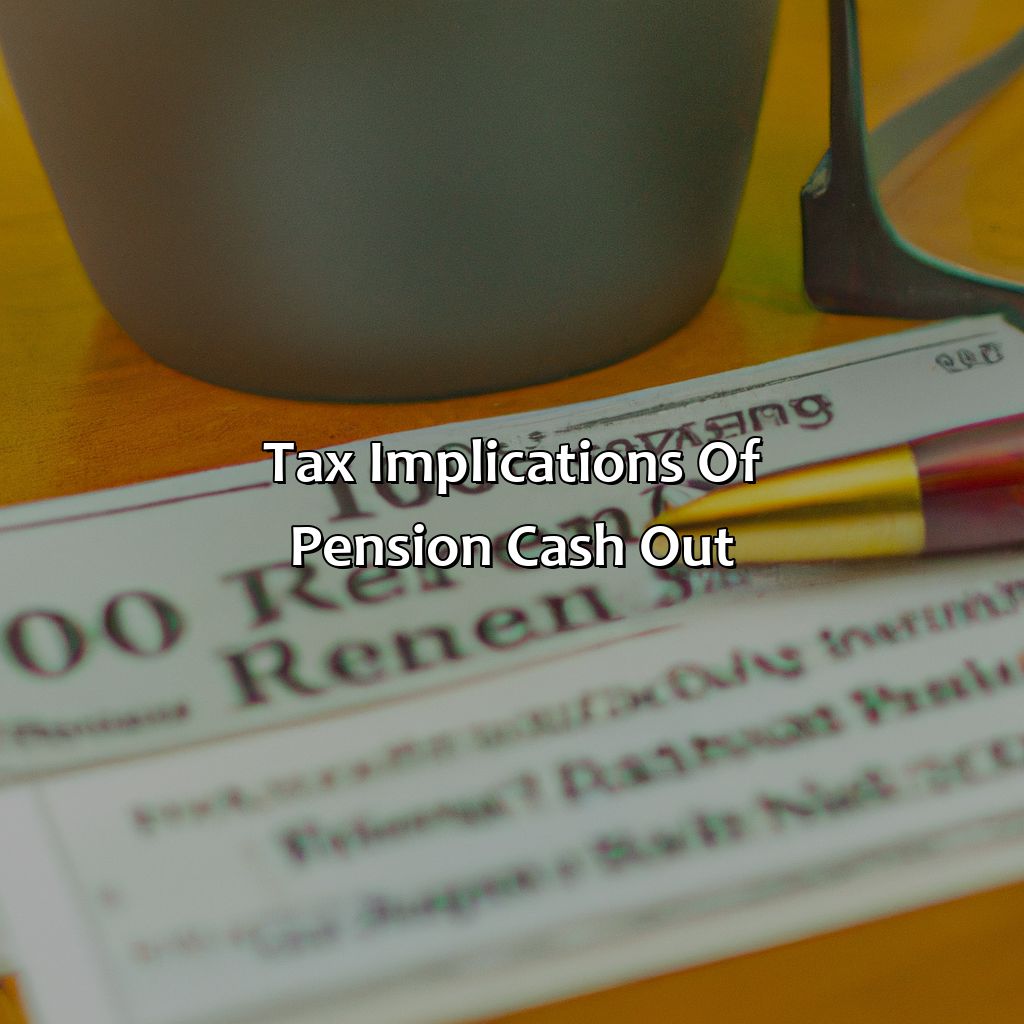
Image credits: retiregenz.com by Joel Washington
Taxable Amount and Withholding
When it comes to receiving a pension cash out, understanding the taxable amount and withholding is crucial. The amount that is taxed depends on various factors, such as the type of plan, the age of the recipient, and the payment option chosen. Withholding rates can also vary depending on the circumstances. A table outlining the taxable amount and withholding for pension cash outs is provided below:
| Type of Plan | Age of Recipient | Payment Option | Taxable Amount | Withholding Rate |
|---|---|---|---|---|
| Defined Benefit Plan | < 55 Years old | Lump Sum | Entire Amount | 20% Federal |
| Defined Benefit Plan | < 55 Years old | Annuity | Taxable Portion | Based on IRS Table |
| Defined Contribution Plan | Any Age | Any Option | Entire Amount | 20% Federal |
It’s important to note that state taxes may also apply in addition to federal taxes. Furthermore, if the entire distribution is not rolled over into another qualified retirement account or IRA within a certain period, additional taxes and penalties may be imposed. It’s worth considering seeking advice from a financial professional before making any decisions regarding pension cash outs. In relevant history, prior to December 2019, recipients of lump sums from defined contribution plans were subject to an automatic withholding rate of 10%. However, with changes introduced by the SECURE Act in December 2019, this increased to 20%. Don’t cash out your pension early, unless you want to be penalized more than a kid caught with their hand in the cookie jar.
Penalties for Early Withdrawal
Early Withdrawal Fees and Impacts on Pension Cash Out
Pension cash out can be a convenient option, but there are penalties for withdrawing early. Such fees can range between 10%-25%, depending on the type of pension scheme and age at withdrawal. The withdrawal may also increase taxable income, leading to higher tax brackets. If you want to know how to get a pension, it’s best to consult with a financial advisor who can guide you through the process.
Besides paying additional charges to the government, certain retirement plans impose extra fees if one takes out any funds before reaching full retirement age. This is because the employers and administrators need to manage funds according to assumptions that pension holders will retire only after reaching their designated retirement age.
Individuals who do not want to pay high taxes could consider taking money out in installments rather than the lump sum option. A recurring income under the installment plan would allow you to remain in a lower tax bracket throughout your golden years.
According to Forbes Magazine, individuals must be at least 59½ years of age when they withdraw funds from their IRA or qualified employer-sponsored plan if they want to avoid heavy penalties and taxes.
Choose your pension cash out option wisely, because the only thing worse than paying taxes is paying unnecessary taxes.
Comparison of Pension Cash Out Options
We’ll compare pension cash out options to decide if lump sum or annuity payment is the best solution. With lump sum, you can address urgent financial needs. Annuity payments guarantee regular income in the future. Let’s examine both options more closely. This way, you can make a well-informed choice for your pension cash out.
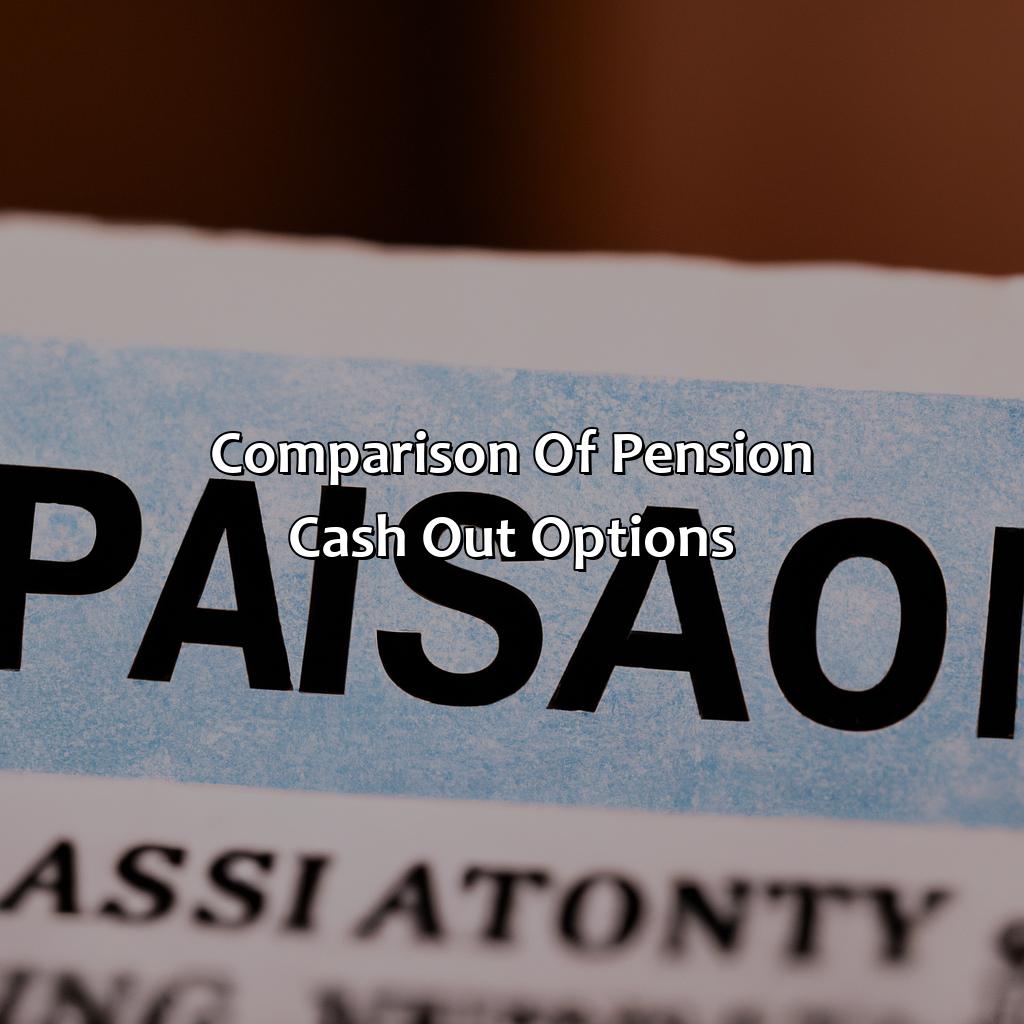
Image credits: retiregenz.com by Adam Jones
Lump Sum Payment
Acquiring a one-time payment from your pension plan can be achieved through the ‘Consolidation Annuity Payment’ option. This NLP variation provides the possibility for a lump sum payment and is an efficient way to cash out your pension benefits. With this option, you can gather your funds into one account and potentially save on administrative expenses associated with managing several accounts.
In addition to gaining access to your funds all at once, choosing consolidation annuity payment allows you to manage them efficiently over time. Unlike monthly payments, which may not suit everyone’s financial needs, this option allows more flexibility when deciding how best to use your pension resources.
Pro Tip: Think long-term before opting for any cash-out options as the distribution will determine how much money remains in retirement.
Annuity payments: the gift that keeps on giving…to someone else.
Annuity Payment
When it comes to receiving regular payments post-retirement, an annuity payment provides a steady stream of income for the chosen duration. It can be either fixed or variable and is determined by factors such as age, gender, amount invested, and interest rates. Annuity payments provide the option to receive a lump sum or steady payments over time.
It is essential to consider long-term needs such as inflation and health conditions while choosing between lump sum and steady payments. Lump sum options might provide immediate access to funds but could prove insufficient in the long run. The timeframe and amount should also be analyzed before making a decision.
Apart from traditional annuities, there are other options such as deferred annuities that allow investing over multiple years resulting in higher returns. The type of annuity chosen impacts its tax implications too, hence consulting with financial advisors is recommended.
Pro Tip: Consider selecting an annuity payment plan that suits your long term needs after taking into consideration factors like age, health status and financial obligations for a stable retirement income stream.
Well-Known Facts About How To Cash Out Pension:
You can typically cash out your pension once you reach 55 years old. (Source: Money Advice Service)
You can choose to take the entire pension amount as a lump sum or opt for regular payments. (Source: Fidelity)
Cashing out a pension before the age of 55 may result in significant penalties or fees. (Source: Pension Wise)
You may be required to pay taxes on cashed-out pension payments, depending on your country’s laws. (Source: Investopedia)
It is important to carefully consider the pros and cons of cashing out a pension, as it may not be the best financial decision for everyone. (Source: The Balance)
FAQs about How To Cash Out Pension?
What is a pension cash-out?
A pension cash-out is when an individual chooses to take a lump sum payment from their pension plan instead of receiving monthly payments for the rest of their life.
Am I eligible to cash out my pension?
Not all pension plans offer a cash-out option, so it’s important to check with your plan administrator to see if it’s available. Additionally, some plans may have restrictions on when you can take a cash-out, such as only during certain periods or after reaching a certain age.
What are the pros and cons of cashing out my pension?
Pros of cashing out your pension include having a lump sum of money to use right away, potentially avoiding fluctuations in the stock market that could impact your pension payments, and being able to pass down any remaining funds to heirs upon your death. Cons of cashing out your pension include potentially receiving less money overall compared to the monthly payments, losing any potential benefits such as cost-of-living adjustments, and potentially facing a higher tax bill.
How do I go about cashing out my pension?
The process of cashing out your pension will vary depending on your specific plan, but typically involves filling out paperwork provided by your plan administrator and selecting the cash-out option. It’s important to fully understand the tax implications and any potential fees before making this decision.
What should I do with the money I receive from cashing out my pension?
This is a personal decision and will depend on your individual financial situation. Some options include paying off debt, investing the money, or using it for major expenses such as a down payment on a home. It’s important to carefully consider your options and potentially consult with a financial advisor.
Can I change my mind after cashing out my pension?
Once you receive the lump sum payment, it is unlikely that you will be able to change your mind and switch back to monthly payments. However, if your plan allows for it, you may be able to roll over the cash-out amount into another retirement savings account to continue growing your savings.
 Checkout this IRS Loophole
Checkout this IRS Loophole 
